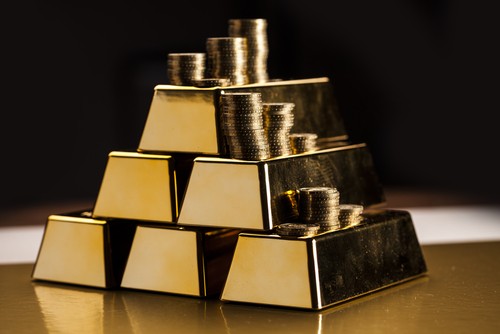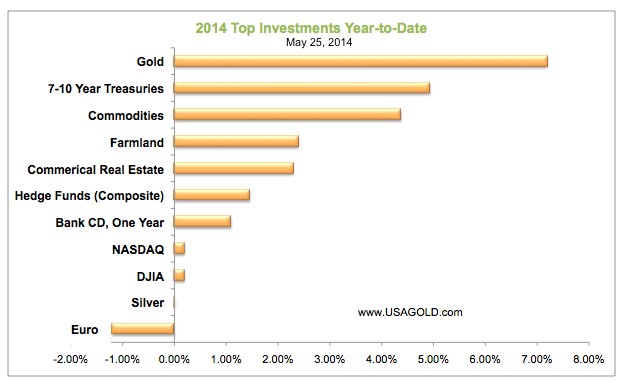USAGOLD Blog
Post on: 8 Июль, 2015 No Comment

End-of-week top gold news
Friday, 13-Mar-2015
(Bloomberg) Is Gold About to Become the Next Safe Haven Trade? Todd Horwitz, founder at Averagejoeoptions.com, and Bloomberg’s Scarlet Fu discuss the recent rebound in the price of gold in today’s Futures In Focus on In The Loop: Gold is in a real sweet spot here. Here is a great spot to start buying gold again. — Todd Horwitz
Note: Obviously there is nothing new about gold being a safe-haven trade, but given the macroeconomic and geopolitical risks presently evident, demand for such a haven could explode with little or no warning.
Charles Hugh-Smith (via ZeroHedge) If Everything’s So Rosy, Why Is This Happening? The financial news is astonishingly rosy: record trade surpluses in China, positive surprises in Europe, the best run of new jobs added to the U.S. economy since the go-go 1990s, and the gift that keeps on giving to consumers everywhere, low oil prices. So if everything is so fantastic, why are new orders cratering? New orders are a snapshot of future demand, as opposed to current retail sales or orders that have been delivered.
Note: Later in the week we saw retail sales drop for a third consecutive month, consumer sentiment drop more than expected and a number of analysts negatively revised their Q1 GDP expectations. Everything doesnt seem very rosy at all.
Michael J. Kosares (USAGOLD) Will the Shanghai Fix fix the gold market? That is not to say though that the new gold market mechanisms will fall short of being transformative. To the contrary, I would counsel to expect major changes in 2015. At the top of the list I would put the likelihood of Shanghai forcing London to honor its pricing by delivering real metal into the China market.
Note: While a battle between east and west for control of the gold market would certainly be exciting, in Mikes view, China seeks synthesis not antithesis. Mike goes on to say that Time is on China’s side and on the side of the gold accumulator who owns his or her metal outright and can afford to sit back and watch the show, however it plays out.
Dhara Ranasinghe (CNBC) Rate cuts: 24 so far and there’s more to come An interest rate cut from South Korea Thursday takes the number of central banks that have stepped up their monetary easing this year to 24 and that number is likely to rise, analysts say.
Note: The winds of global monetary policy are pretty clearly favoring the doves, and yet many remain confident that the Fed is going to sail into that headwind. I remain skeptical.
James Rickards (Daily Reckoning) Three Catalysts for the Price of Gold The total growth in global gold supplies is about 1.5% per year and has been slowing lately. Compare this to the 400% growth in base money engineered by the Federal Reserve since 2008, and it’s easy to see how a lot more money chasing a small amount of gold will cause the dollar price of gold to rise over time.
Note: The supply differential in and of itself is compelling enough, but Rickards lays out the reasons why gold does well in inflation, extreme deflation, panic, and an environment of negative real rates.
Nathan Lewis (via USAGOLD) Greece’s monetary options include a gold drachma [E]conomist Nathan Lewis (Gold: The Once and Future Money) outlines Greece’s currency options with a clarity I have not seen elsewhere. After running through a number of possibilities, he concludes by suggesting a drachma “linked to gold” – a new and innovative approach but one firmly rooted in Greece’s ancient commercial history.
Note: A fascinating article with an introduction from our own Mike Kosares.
Greeces monetary options include a gold drachma
MK Note: Below economist Nathan Lewis (Gold: The Once and Future Money ) outlines Greeces currency options with a clarity I have not seen elsewhere. After running through a number of possibilities, he concludes by suggesting a drachma linked to gold – a new and innovative approach but one firmly rooted in Greeces ancient commercial history.
The coin shown at the left was minted in electrum, an alloy of gold and silver, by Lydias King Croesus in 550 BC. Now in the British Museum collection, it is a surviving specimen of the very first gold coin. The croesid standardized weight and purity making it possible for known and understood value to pass in Greek antiquity from one hand to the next with confidence. From Croesus comes the legend of Midas and the golden touch.
This gold coin and its successors fueled commerce throughout the classical world eventually leading to Athens introduction of the first drachma – the silver Athenian owl in the fifth century BC. The word drachma translates to fistful or handful. Croesus’ invention ranks in importance with the invention of the wheel. Of course, the use of gold coins as money and as a reliable store of value has endured to this day. If Greece were to take Nathan Lewis advice and issue a new gold-linked drachma, that currency could trace its lineage directly to this nearly 2600 year old ancient coin and the invention of money itself.
_________________________
by Nathan Lewis
Greeces new government has been pondering how and when to default on the mountain of debt it has inherited. It now exceeds 175% of GDP. For some reason, defaulting on this debt supposedly entails leaving the Eurozone and possibly introducing a new, independent floating currency, perhaps reviving the name Drachma.
But is this necessary? It is not necessary at all.
A default just means not paying some money back. This does not require a government to issue a new currency, just as a homeowner who defaults on a mortgage obligation is not required to issue a new currency. You just walk away, which is perhaps even easier on the sovereign level, since the debt is not collateralized.
But lets assume that, in a fit of pique, the European Central Bank and other monetary institutions do decide to exclude Greek institutions from the official Eurozone system, and in one way or another kick Greece out of the Eurozone, whatever that means in practical terms.
What then? Greece could continue to use the Euro. It would join ten other small states and territories that use Euros exclusively, without being part of the Eurozone. These include Andorra, Monaco, and Montenegro. At least ten countries have a similar policy, but use the Dollar instead, including Panama and Ecuador, which Dollarized in 2000. Ecuadors government defaulted on its sovereign debt in 2008, but continued to use the Dollar afterwards.
So, we see that debt default, and the choice of currency in use, dont really have much to do with each other at all. Five countries use New Zealand Dollars exclusively; three use Australian Dollars; and one (Lesotho) uses South African Rands exclusively. Liechtenstein uses Swiss Francs.
Greece is far larger than these tiny states, so although such an outcome is technically possible, it might be a bit uncomfortable politically. Greeces government might then consider an open currency policy, whereby any Greek entity may use the currency of their choice. The government does not officially endorse any single currency, and there is no domestic currency.

We might imagine that Euros would continue to be the primary currency in use, but perhaps Turkish Lira, Chinese Yuan, and US Dollars could find wide adoption.
This solution is similar to that adopted by Zimbabwe, which has no domestic currency and an official multi-currency policy. The US Dollar is peoples primary choice, but Euros and South African Rands are also popular. This is despite the fact that Zimbabwes government is very unpopular with the US State Department.
Actually, this outcome is not so much different than the situation in Greece before the adoption of the Euro, when German Marks were often in use. Corporations and indeed the government itself issued debt denominated in Marks.
Another option for Greece would be to introduce a domestic currency, but link it to the Euro via a currency board system. This arrangement is already in use by several states that are not Eurozone members, including Bulgaria, Bosnia, Denmark and at least fourteen countries in Africa. It was also in use by Estonia and Lithuania, before those countries entered the Eurozone.
Greeces government could, of course, introduce its own floating fiat currency, and mandate its use domestically, although I suspect the government itself would end up issuing debt in foreign currencies before too long. A number of economists have been promoting this idea, apparently for the primary purpose of devaluing the currency by a large amount immediately thereafter.
Greeks themselves know a little about this: between 1981 and 2000, when the Euro was introduced in Greece, the Drachma fell to one-eighth of its initial value against the US Dollar. This was so successful that Greeks trash-canned their old junk currency and embraced the Euro.
The world is full of junk currencies, and Greeks know exactly what results they produce. If the government is going to introduce a new currency on the world stage, it should have at least a hope of being better than the Euro, Yuan, Dollar, or other options.
I suggest a new Drachma linked to gold. The previous one was created in 1832, soon after the establishment of the modern state of Greece, as independent from the crumbling Ottoman Empire. It replaced the Ottoman kurus as the currency of Greece. The 20 Drachma coin contained 5.8 grams of gold. Paper banknotes, linked to gold, were issued by the National Bank of Greece beginning in 1841.
The government would now have a multi-currency policy, where people could use any currency they wish in commerce and as a basis for contracts, including Euros, Dollars, or Russian Rubles. Among those options, would be the option of a gold-based currency. Nobody needs to use it. They could use Euros or Dollars instead. But, they could use it if they wanted to. It might become popular, just as gold-based ETFs have become popular worldwide as an investment vehicle.
Zimbabwes government recently floated the idea of introducing a new Zimbabwean gold-based currency to the existing multi-currency arrangement. This new currency could be provided by a monopoly issuer, like a central bank, or it could be issued by multiple commercial banks, as is the case today in Scotland for example.
The new gold Drachma might even become popular in the Eurozone itself. Many Europeans seem to want to own Swiss Franc-based assets, presumably because they perceive some independence from all of the problems related to the Eurozone. A sound gold Drachma might be even more popular than a floating Swiss Franc. Greece could become a financial center as a result.
_________________________
This article is reprinted in full with Nathan Lewis permission. It first appeared at the Forbes magazine website in late February.
Recommended: New World Economics /Nathan Lewis














